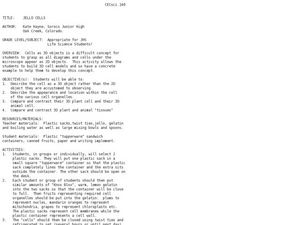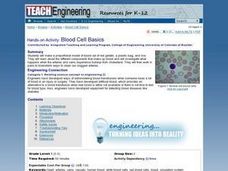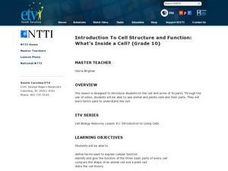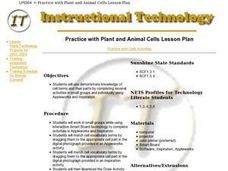Curated OER
Jello Cells
Students create a three dimensional model of a cell. In this cellular structure lesson, students use gelatin, plastic bags, plastic containers, and fruit to construct a model of a cell. They compare the cells structures and stack them to...
Curated OER
Introduction to Human Anatomy & Physiology
If the only support you are in search of is lists of vocabulary terms, this presentation may fit the bill. Slides simply list terminology. These categories are included: hierarchy of structural organization, cell functions, cell...
Curated OER
The Great Animal Systems Challenge!
Advanced placement biology aces list systems that have evolved over time, adaptations, and structure-function relationships. The resource requires plenty of writing to answer these questions, so allow a few days for them to complete the...
Curated OER
Who Does What Quiz #1: Cell Structures
For this "who does what" quiz worksheet, students complete an on-line game, clicking on questions and matching answer cards and scoring 1 point per correct answer. Printable version available also.
Curated OER
Preparation and Staining of Mammal Cells to View Sister Chromatids
Observation of sister chromatids is possible as students culture and stain mammal tissue cells.
Curated OER
Blood Cell Basics
Students design a proportional model of blood out of red gelatin, a plastic bag, and rice. They study the components that make up blood and investigate what happens when the arteries in different scenerios. They work in pairs in order to...
Curated OER
Extracting DNA from Your Cells
Three steps are needed to extract DNA from learners' inner cheek cells. The procedure and reasons for each step are explained. As enzymes work on the cells, a series of questions are answered regarding the structure of the DNA molecule....
Teach Engineering
Cellular Respiration and Bioremediation
You can breathe easily now that you've found a winning resource. Young biologists learn about the process of cellular respiration, primarily through teacher-led discussion and instruction. They also consider the concept of...
Ask a Biologist
Neuron Anatomy Activity
Reinforce the neural connections in the brains of your young biologists with a simple anatomy worksheet. Looking at the provided diagram of a neuron, students are asked to correctly identify and describe the function of each of the six...
Curated OER
Cell Factory
Students examine the basic structures and functions of cells. They design and construct a factory cell model where each factory part corresponds to a cell part.
Curated OER
Parts of a Cell
Young scholars explore the parts of a cell. They identify the structures of plant and animal cells. Students explain the functions of plant and animal cells. They compare and contrast animal cells to plant cells. Young scholars create a...
Curated OER
The Cell - Internet Activity
In this cells worksheet, students click on the links to learn about the plant and animal cells complete a comparison chart and answer short answer questions about it. Students complete 10 questions total.
Howard Hughes Medical Institute
Viral Lysis and Budding
How do some viruses spread so quickly, and why do they make us feel terrible? Answer these (and many more) questions through a simple yet impactful lessons. Pupils observe demonstrations that show the two methods viruses use to escape...
Cornell University
Plant Cell Crime Scene
Use science to solve the mystery of the Poplar murder. Pupils use forensic botany to determine if a suspect could be the killer. By analyzing images from a Transmission Electron Microscope, learners determine if the material found on the...
Curated OER
Cell Structures and Functions
Fifth graders search into animal and cell characteristics and their functions in this seven lesson plan unit. Replicas of the cell are constructed out of Jell-O as students probe the internet for details of the concepts.
Curated OER
Introduction To Cell Structure and Function: What's Inside a Cell?
Tenth graders are introduced to the cell and some of its parts. Through the use of video, 10th graders see animal and plants cells and their parts. They learn terms used to explain the cell.
Curated OER
Practice with Plant and Animal Cells
Students work in small groups to match cell vocabulary terms to the appropriate cell part in a photograph. They use a draw program to sketch a plant and animal cell.
Curated OER
Those Cells Look Good Enough to Eat
Students explore the parts of the cell. For this cell lesson, students use foods to create cell models that represent the nucleus, cytoplasm, cell membrane, mitochondria, ribosomes, vacuoles, endoplasmic reticulum, and Golgi bodies...
Curated OER
Cell Organelles
Young scholars explore biology by researching living cells. In this living organism lesson, students participate in a role-playing activity in which all the young scholars in class form one plant cell by portraying specific parts of a...
Curated OER
Cells in the Making
Students examine and research the parts of a cell, their functions, and life processes. They simulate how cells receive nutrients using coffee filters, water, and coffee, and construct cells using pudding, cookie dough, and candy.
Curated OER
Selling Cells: a Study of Organelles and Cell Structure
Students study cellular structures and functions. In this cell function lesson students participate in a class discussion then make a drawing of the cell they are discussing.
Curated OER
Cell 5 Diffusion and Osmosis
Students distinguish between active and passive transport. Students identify key words associated with active and passive transport. They draw and explain the structure f the cellular membrane. They are able to define phospholipid...
Curated OER
Standard 4 Review Sheet-Key Ideas Biology-The Living Environment
In this living environment worksheet, students answer a variety of questions about living organisms, the processes they go through to make food and break down food, absorb nutrients, and release toxins. They explain homeostasis, they...
Virginia Department of Education
DNA Structure, Nucleic Acids, and Proteins
What is in that double helix? Explain intricate concepts with a variety of creative activities in a activity that incorporates multiple steps to cover DNA structure, nucleic acids, and proteins. Pupils explore the history of DNA...

























